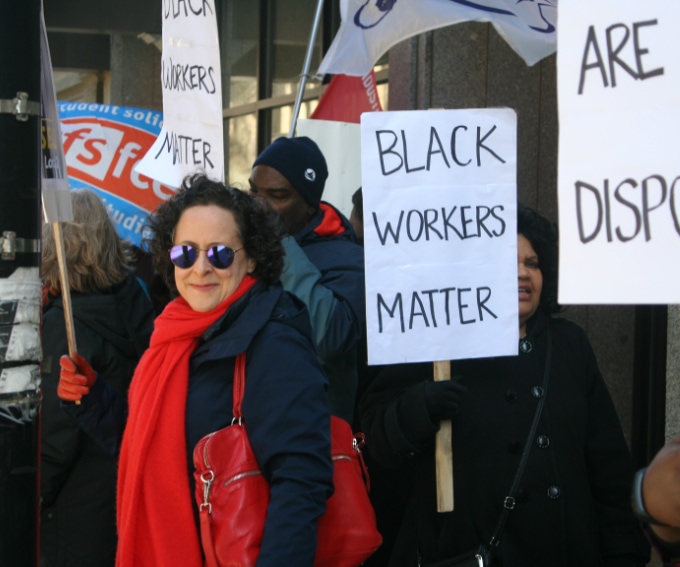This artilce was originally published on April 4 in the excellent RankandFile.ca and is republished with Jason Edwards’ and RankandFile’s kind permission.
KJIPUKTUK (Halifax) – Two weeks ago, a story came to light about seven cleaners who had received notice of layoff after the contractor who employed them lost the cleaning contract at central Halifax’s Founders Square.

Of the eight cleaners who had been working at the site, all seven of African descent were given notice of layoff. A single white crew member was told he would kept on.
On Friday, March 23, the cleaners announced that they would be filing a complaint with the Nova Scotia Human Rights Commission. The next day, approximately one week before the contract ended, the cleaners were abruptly fired.
The property manager, Armour Group, responded to the allegations of racial discrimination by claiming that the cleaners who had been let go were sub-par employees.
Community response
Community groups have lined up in support of the cleaners. Former Poet Laureate and well-known local activist El Jones responded to Armour’s line, calling it “an attempt to refocus conversation on speculations about the performance of the janitors rather than on anti-Black racism and on the attack on unionized labour,” adding:
We should also recognize that attempts to paint the Black workers as lazy, unclean, and negligent have long historical roots in stereotypes and portrayals of Black people that date far back into slavery.
Robert Wright, a social worker, renowned expert on race relations, and a tenant of Founders Square, wrote a statement in support of the cleaners, including that:
when it comes to complaints about those who serve us, people feel more free to complain about the services rendered by immigrants or people of colour. This is not only true of janitorial services, but also about professional roles as well.
Working in property services
Sadly, this story is all too familiar. In Nova Scotia, employees performing property services — where women, new immigrants, black, indigenous, and other people of colour are vastly overrepresented — face constant downward pressure on their wages and working conditions.
Property managers, trying to maintain their properties at the lowest possible cost, leverage property services contractors against one-another. The contractors bid as low as possible, often at rates near and even below minimum wage, to win contracts.
The result is that property services workers — cleaners, foodservice workers, security guards — face job-insecurity and extremely poor working conditions. Even where property services workers have made gains through collective action and organizing unions, the downward pressure from competing contractors does not relent.
Successor rights
In the usual course, when a business is sold the employees are kept on and their employment contracts are honoured. In the case of unionized workers, the employment contract is the collective agreement. Section 31 of Nova Scotia’s Trade Union Act requires an employer who purchases a business to honour the existing collective agreement. This concept is called “successor rights’.
In property services, when a contract is “flipped” (awarded to a different contractor) successor rights do not apply. This is the case even though the same work is being done, in the same location, often by the same employees. Nothing has changed except the workers’ uniforms, the contractor profiting from their work, and any gains the workers have made are erased; it is back to minimum wage.
Extending successor rights to property services: The Ontario approach
Ontario has extended successor rights to property services workers. Section 69.1 of the Labour Relations Act deems a flipped property services contract to be a sale of business. Even though the employer has changed, the union and the collective agreement remain in place.
69.1 (3) For the purposes of section 69, the sale of a business is deemed to have occurred,
(a) if employees perform services at premises that are their principal place of work;
(b) if their employer ceases, in whole or in part, to provide the services at those premises; and
(c) if substantially similar services are subsequently provided at the premises under the direction of another employer.
The section 69 referred to provides successor rights when a sale of business has occurred.
Ontario also provides some protections to workers who are not in a union when a property services contract is flipped. Section 75 of the Employment Standards Act requires a new contractor to pay severance to any employees it does not rehire when it takes over a contract. Thus, the new contractor is incentivized to keep the staff in their jobs. The new contractor is also entitled to the workers’ contact information so that it may extend job offers to them before taking over the contract.
The protections in Ontario are far from perfect. Property services workers there still do some of the hardest work, for the lowest pay and the least job security. That said, the modest protections in the Labour Relations Act and Employment Standards Act have benefited those workers.
Nova Scotia needs successor rights for property service workers
Nova Scotia should follow that example and legislate similar protections for these workers. The legislation is uncomplicated: we would just need to deem a contract flip to constitute a sale of business for the purposes of successor rights, like section 69.1 above.
The costs this change would impose on property service contractors, property managers, property owners, and tenants are negligible. In any case, an increase in costs is warranted, as these groups have benefitted from the vulnerability and constantt low wages of property services workers for far too long.
Because racialized workers, new immigrants and women are so over-represented in low-waged and precarious jobs, this small change would have the impact of lessening racial and gendered disparity in our economy.
Extending successor rights to property services workers is a necessary change that would help prevent another situation like the one we’ve seen at Founders Square.
See also: Commissionaires latest victims of Stanfield International Airport cost saving ways
If you can, please support the Nova Scotia Advocate so that it can continue to cover issues such as poverty, racism, exclusion, workers’ rights and the environment in Nova Scotia. A pay wall is not an option, since it would exclude many readers who don’t have any disposable income at all. We rely entirely on one-time donations and a tiny but mighty group of dedicated monthly sustainers.



